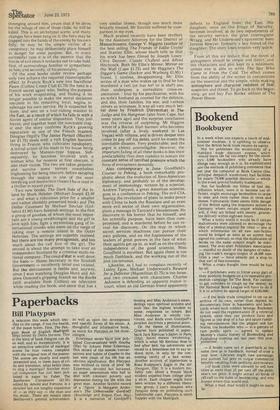Bookend
Bookbuyer
In a week when one expects a touch of midsummer madness, it is uplifting to observe how the British book trade retains its sanity. Not for publishers the eccentricity of a standard trade discount system which would leave life far too empty for the country's 3,000 booksellers who already have 'things easy enough as it is. So sophisticated are the methods of publishing commerce that last year the computer' at Book Centre (the principal despatch warehouse) had facilities for nearly 70,000 possible discounts — which in the event proved foolishly inadequate.
Not for bodkfolk the follies of fast distribution which, were it to become too efficient, might encourage booksellers to order in ones and twos rather than in twos and threes. Fortunately there seems little danger of the British aping the iniquitous system in Germany where certain major wholesalers will, if they are bribed with money, guarantee delivery within eighteen hours. What a nutty world it would be if certain malcontents were allowed to encourage the idea of a central registry for titles — one at which information on all new non-fiction could be lodged as soon as an author had signed his contract, so that the duplication of books on the same subject might be minimised. The ever-alert Publishers Association — mindful no doubt of the dangers of reducing the trade's meagre output of 24,000 new titles a year — have already put a stop to that sort of fine nonsense.
What a crazy fraught time would be had by all: — if publishers were to fritter away Part of their publicity budgets on a co-operative promotion campaign for The Book. Far cannier to get outsiders to cough up the money, as the National Book League will have to do if it is to achieve its appeal target of £250,000;
— if the book trade conspired to set up an archive of its own, rather than deposit its documentary litter in basements and backyards where such rubbish belongs. Bookmen do not need the regimentation of a retrieval system. since they can produce facts and figures at the drop of a hat and spurn rambling reminiscences like the plague: ask Ian Norrie, the bookseller who — in a gesture of rare public spirit — agreed to update
Mumby's classic history of Bookselling and Publishing (coming out last year, this year, tsometime.... );
— if books came out in paperback at the same time as in hardback, instead of over a year later. Libraries might lose patronage, and authors fall prey to vulgar commercial benefits resulting from publicity and reviews; .if book clubs were allowed to sell new titles at more than '25 per cent off the publisher's net price. It might attract all kinds of riff-raff to the habit of bookbuying, and who knows where that would end.
What a mad, mad world it might so easily be.


































 Previous page
Previous page